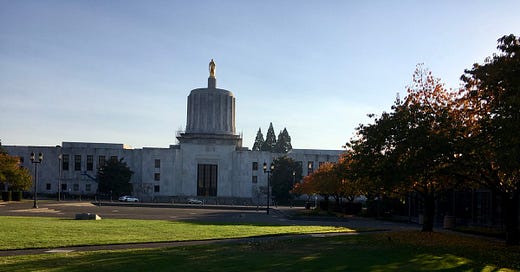Amid good revenue news there is coal in the state’s stocking
Deaths outnumber births, families are fleeing to other states, housing remains unaffordable and the workforce may be shrinking
The State of Oregon received a $218 million Christmas bonus. Oregon income taxpayers will reap a record-shattering $5.61 billion kicker refund on their tax returns next year. But leave it to economists to be party-poopers.
The most recent state economic and revenue report contains lots of nuggets that some might view as coal in a Christmas stocking.
For example, Oregon’s population is shrinking because of the outmigration of families, some of whom may be leaving for more affordable housing and others for more accommodating politics. Deaths continue to outpace births. The 18-24 age group is the only cohort moving in, and they aren’t always big taxpayers.
The report manages to find the ominous dimension of the recent burst of tax revenues from high-income Oregonians and corporate profits by noting that as Oregon’s Baby Boomers age, they are working less and paying less taxes, which could depress future tax revenues.
What would seem like good news – reduced inflation and a stabilizing labor market – has its dark side, too. Less inflation and slower wage growth will return profits and incomes to more normal levels, which in turn will return tax revenues to their normal levels.
Even the original revenue forecast number was revised downward from $335 million in new cash to $218 million because an estate tax transfer that goes toward PERS underfunding was inadvertently omitted.
State interest earnings will decline after kicker refunds head to taxpayers next year, reducing state fund balances. The state is on schedule to earn $8.2 million in interest in the current biennium, but only $4.4 million in the next biennium and even less in the following biennium. It’s possible the Fed will begin to lower interest rates next year, a boon for home and car buyers, but a bust for state revenue earnings.
Then there are the existential external threats – a belated recession, sagging international commerce and the possibility under a Trump administration of extensive tariffs, which in reality consumers pay, not foreign exporters.
“The primary downside risk facing the near-term revenue forecast is the uncertain future of the nationwide economic expansion,” according to state economists. “Should high interest rates, federal policy woes or economic weakness among our trading partners derail the U.S. economy, the expected growth in Oregon’s tax collections will not come to pass.”
On the margins of the big picture, state economists note marijuana revenues are up and tobacco tax revenues are trending down faster than assumed in previous revenue reports.
State economists sum up their extended revenue forecast with this less-than-encouraging observation:
“Revenue growth in Oregon and other states will face considerable downward pressure over the 10-year extended forecast horizon. As the baby boom population cohort works less and spends less, traditional state tax instruments such as personal income taxes and general sales taxes will become less effective, and revenue growth will fail to match the pace seen in the past.”
The prospect of future harder times doesn’t dull the zest for spending now. Governor Kotek will submit a $14 million supplemental funding request to the 2024 legislative session for more homeless shelters, addiction treatment and childcare.
“Oregon’s economy is continuing to stabilize, and that is good news for working families and businesses across our state,” she said. “To keep our economy moving in the right direction, we need to address core issues for Oregonians. Housing production, the addiction crisis, and access to childcare are at the top of the list.”
The Department of Transportation will seek added funding to plow winter snow on state highways and remove graffiti from bridges. The highly visible teacher strike in Portland, plus ongoing teacher contract negotiations in 70 other Oregon school districts, also could produce a plea for more K-12 education funding.
The possibility that skyrocketing tax revenue may be returning to earth, prompted House Speaker Dan Rayfield, D-Corvallis, to urge moderation in making long-term spending commitments during the 2024 session. However, he endorsed Kotek’s spending goals. “Stability is the key to developing legislation to address critical issues like access to mental health and addiction treatment, affordable housing, and sustainable childcare funding to enact during the February legislative session.”
His House counterpart seemed less convinced. “The revenue forecast shows a stable economic outlook in the short term. While this is good news for today, I am worried about tomorrow,” said House Republican Leader Jeff Helfrich, R-Hood River. “My concern is for Oregon’s future economic outlook. Population in Oregon is stagnating as people flee – and choose not to move near – the drugs and crime Oregon is rapidly becoming known for. This will have long-term consequences on revenues, which will further strain resources needed to address critical needs.”
Senate Majority Leader Kate Lieber, D-Beaverton, said, “ In 2024, we will be laser-focused on the issues that seriously impact quality of life in Oregon, like building more housing Oregonians can actually afford, taking on the drug crisis to keep people safe and save lives, and making it easier to work and grow a business here.”
Senate Republican Leader Tim Knopp, R-Bend, didn’t issue a statement on the latest revenue forecast.
Gary Conkling has been a newsman, congressional aide and public affairs professional for more than 50 years.





